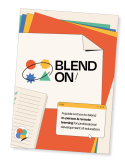In Practice
How VSO prepared facilitators using the SAMR Model
VSO has been running home-based Early Childhood Education (ECE) centres in the Rohingya camps in Jamtoli, Cox’s Bazar since 2018 and this programme was extended to host communities in 2020.
Most ECE facilitators are mothers and sisters from Rohingya and host communities who do not have any training. VSO worked with MESHGUIDES to develop a course which promotes a play-based ECE approach. After assessing ECE facilitators’ educational background and access to digital devices and their experience of using technology, it was found that none of the facilitators had prior teaching experience. Only 10% of the facilitators had experience of using basic mobile phones.
On the one hand, ECE facilitators did not have confidence in using play-based teaching methods and needed a lot of support and training, on the other hand, logistically it was challenging for VSO teacher trainers and mentors to visit the camp regularly to deliver face to face training. Therefore, VSO considered an Edtech solution. All ECE facilitators were given a tablet preloaded with videos of songs, stories, and model lessons.
By applying the SAMR Model, VSO could adapt the teacher training as follows:
- Substitution: printed teacher guide on play-based ECE was replaced by a digital version.
- Augmentation: national volunteers produced a series of videos showing how to make play resources from locally available recycled/reusable materials in local languages so that facilitators could watch videos and follow instructions to make teaching materials.
- Modification: watching videos from other countries, ECE facilitators identified used bamboo, recycled plastic bottles and scrap fabric to make play resources.
Share this practice:
In Practice
You can find out more practical use cases here
Subscribe to newsletter

Download our guide for a more in-depth and comprehensive look at developing a successful blended CPD programme.
© Copyright 2023 VVOB - vvob.org